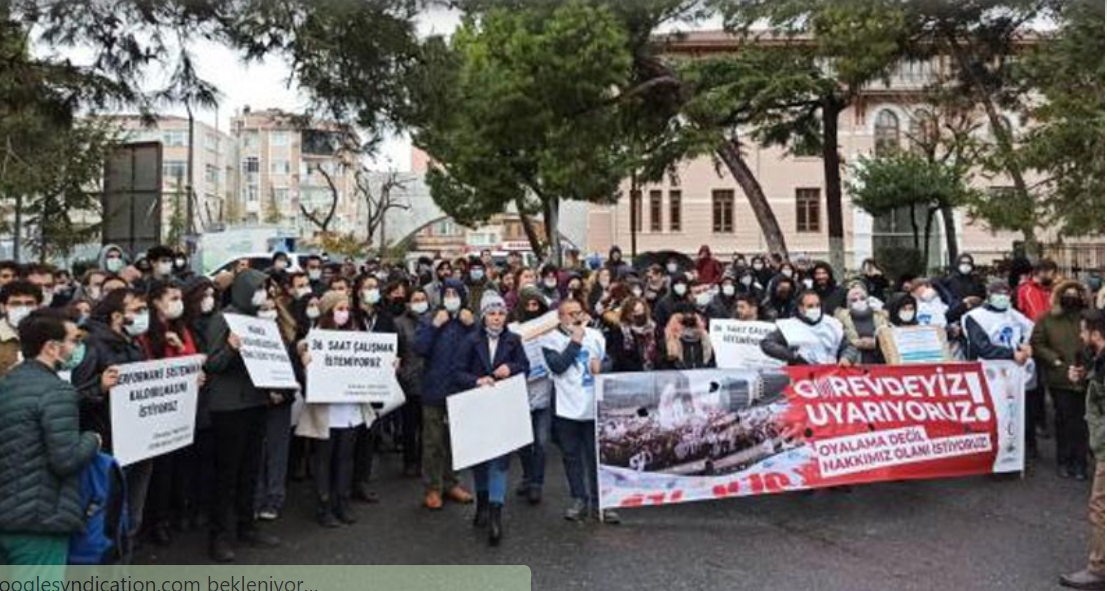Strikes in Turkey have reached a level not seen since the 1970s as workers seek wage rises to compensate for spiraling living costs, reports Ahval News. 2021 GDP data revealed yet another drop in labor’s share of national income, as an index measuring CPI in Istanbul soared to 55% as of February. Ukraine War is expected to worsen Turkey’s economic woes, with strikes possibly spreading to low-income classes and small businesses.
President Recep Tayyip Erdogan’s gamble on turning Turkey into a manufacturing power propelled by a cheap lira is being buffeted by a wave of industrial action as runaway prices consume wages, commented Bloomberg.
Inflation surged to an annual 48.7 percent in January, with drastic rises in the price of basic amenities such as bread and electricity.
Earlier this month, employees at supermarket chain Migros halted work in protest at a proposed 8 percent pay rise, which they say would have left them unfairly out of pocket.
Migros sacked more than 250 of the striking workers, sparking further walks outs and an investigation by the Labor and Social Security Ministry. The supermarket chain later backed down, reinstating those dismissed and accepting a more significant pay rise.
“We were asking for the price of a loaf of bread! It’s nothing compared to what we’ve helped them earn since the pandemic began,” Bekir Gök, one of the workers involved, told AFP.
Turkey saw significant industrial unrest in the 1970s, before the 1980 military coup cracked down on union activity. But the country has now seen more than 60 strikes and protests involving at least 13,500 workers in less than two months, AFP said, citing data from the independent Labor Studies Group.
High profile examples include couriers for Turkey’s food delivery giant Yemeksepeti, who have joined a wave of protests by workers employed as individual contractors that are pushing for better employment rights as well as improved pay and conditions.
“We have no hope left,” courier Ferhat Uyar told AFP. “We continue this resistance to try and get ahead of the issues.”
Health workers are also expected to strike next month over diminishing pay and heavy workloads caused in part by the COVID-19 pandemic.
The widespread industrial action comes as the government faces growing pressure to act on the cost of living ahead of crucial elections scheduled to take place next year.
Last week, President Recep Tayyip Erdogan announced a lowering of the level at which higher electricity tariffs kick in, with state subsidies to help lower incomes households pay for high natural gas and power bills. The move followed public outcry at the growing cost of energy, including shop keepers displaying their utility bills in their windows.
The move comes amid signs that economic concerns are eroding the president’s support. Can Selçuki, director of the Turkiye Raporu polling agency, told the Financial Times that there was a growing chance of disillusioned government voters choosing to stay at home on election day.
One long term Erdogan supporter told the British newspaper that she had not yet made up her mind. “I’m undecided – like a lot of people,” said Melike, 46, who asked to be identified by a pseudonym. “The main reason is the economy. In the early days (the ruling party) were amazing. But in the recent period, the problems began.”
Civil Unrest Mushrooms Across Turkey
Arzu Cerkezoglu, president of Turkey’s Confederation of Progressive Trade Unions, says workers have had enough. “An increase in the minimum wage was promoted as a strong raise, but it was washed away before people were paid,” she said.
Labor-union confederation Turk-Is calculates a family of four needs 4,249 liras per month to keep itself fed, and 13,843 liras to stay above the poverty line.
Support for Erdogan’s AK Party has fallen, though many loyalists say they continue to have confidence in the president. A Metropoll study in February showed 72% of people unhappy with living conditions. Backing for the ruling party has fallen to 25%, its core level of support, said Ozer Sencar, head of the pollster, though that rises to 33% once undecided voters are distributed, added Bloomberg.
Follow our English language YouTube videos @ REAL TURKEY:
https://www.youtube.com/channel/UCKpFJB4GFiNkhmpVZQ_d9Rg
And content at Twitter: @AtillaEng
